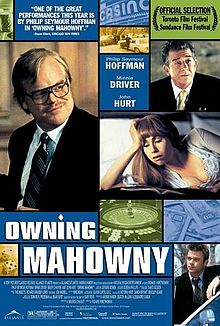Gamblers Continuous
Main Cast: Philip Seymour Hoffman, Minnie Driver, John Hurt
Director: Richard Kwietniowski
I don’t understand gambling. My inherently pessimistic nature dictates that I approach any game of chance with trepidation. It isn’t thrilling; it’s only stressful, as I’m positive that I will lose. I can only imagine that the larger the stakes, the greater the dread. Not so for Dan Mahowny (Philip Seymour Hoffman). Dan is always one step away from his next big win. Or loss. In actuality it doesn’t really matter. Dan Mahowny is an addict, and his substance of choice is gambling.
Owning Mahowny is Dan’s story. Or, rather, part of his story. We don’t see how he began gambling, or his slow descent into financial, ethical and personal peril. We drop into the story at a point where Dan already has a “financial situation” (read: gambling addiction). Not that he’s being threatened by loan sharks who want to break his thumbs. No, the reality is, for Dan, far worse. His bookie is cutting him off. Even if he pays his debt, he’ll no longer be allowed to play. This fills Dan with far greater fear than any threat of physical harm. He has to play. He has to.
Dan has a very normal looking “other” life. He’s recently been promoted at, and is a valued employee of, the bank at which he works; he has a lovely girlfriend Belinda (Minnie Driver) with whom he is in the process of renting an apartment. Pretty sweet deal. Except that Dan’s “financial situation” has reached the inevitable implosion point. He must do something to continue gambling. The actions he chooses to take become the stuff of casino legend and public record. For, you see, Dan’s is a true story.
This film is the closest I’ve ever come to gaining some real insight into gambling addiction. This is first and foremost due to one thing: Philip Seymour Hoffman. He completely becomes Dan Mahowny. Dan isn’t what may come to mind as a “typical” gambler. He’s steady, introverted and persistently morose. Whether he’s winning or losing, he lacks the kind of mania we would normally be shown as he traverses the ups and downs of the chronic gambler. We see it in peripheral characters, but not in Dan. Only when he’s disturbed by his “other” life while he’s at the tables does he overtly show how detached from reality he is as he plays. Hoffman is nothing short of fabulous. He never once takes the easy road of making Dan pitiable and filled with remorse for his actions. He maintains Dan as a man with a singular focus: to gamble. His flashes of desperation when faced with going cold turkey are even subdued, with Hoffman exuding just enough tension to get the point across without any histrionics. He maintains the same level of stoic gloom outside the casino as well. When he is forced to interact and be jovial on the job, we can see the strain, the falseness in every smile, every lame joke. We can see the relief once he’s back in his office, no longer called upon to present this façade.
Supporting this stellar starring performance is a deliciously weasely John Hurt as a casino owner. His callous and frank manipulations leading to something approximating an actual relationship elevate the character above the standard casino bad guy. Hurt handles the character with aplomb and just the right amount of malicious humor with just a touch of compassion. Minnie Driver is slightly less successful as Belinda. The story takes place in 1982, and her enormous bangs and huge glasses look too costume-y. She also has trouble pulling off the Canadian accent (they live in Toronto). She has her “aboots” and “ehs”, but they sound forced and overdone. She really has a completely thankless role. The girlfriend of the very prominent lead character just isn’t ever going to be a juicy part, and she seems stuck playing them.
Owning Mahowny is filled with great casino visuals, as we watch Dan through security cameras, from the floor, through the eyes of others. The reeking desperation of the casino swirls all around him, as he remains a solitary, self contained obsessive in its midst. Photographer Oliver Curtis does a great job contrasting the introverted Dan with the gaudy excess of the casino.
Owning Mahowny is the best kind of film. It shines some real light on a subject that (at least by me) is poorly understood without getting preachy and moralistic. It has the inimitable ring of truth and the support of an outstanding lead performance. I’m still unmoved by the appeal of the slot machine, but I feel like I have a little more empathy for those who self-destruct in these neon hellholes. That’s a pretty impressive accomplishment for a fairly modest film. Writer Maurice Chauvet and director Richard Kwietniowski deserve accolades for making a film with such quiet impact. The final scene is poignant and painful in its honesty. Four and a half stars, highly recommended.

Sue reads a lot, writes a lot, edits a lot, and loves a good craft. She was deemed “too picky” to proofread her children’s school papers and wears this as a badge of honor. She is also proud of her aggressively average knitting skills. TV and indie movies are her jam.





Leave a Reply